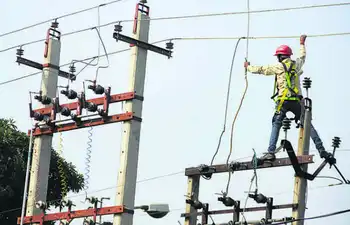Wind energy decision carries political impact
By Washington Times
Electrical Testing & Commissioning of Power Systems
Our customized live online or in‑person group training can be delivered to your staff at your location.

- Live Online
- 12 hours Instructor-led
- Group Training Available
After nine years in the government regulatory mill, backers of the Cape Wind project off the shores of Massachusetts Cape Cod will learn by April 30 whether Mr. Obama and Interior Secretary Ken Salazar will let them proceed, with potentially farreaching consequences for the industry if the project is quashed.
Mark Rodgers, spokesman for Cape Wind developer Energy Management Inc. of Boston, said that the project is being closely watched because it is the first of its kind in the United States, with a number of other projects being eyed along the Atlantic coastline. Given the length of the regulatory approval process, it will likely be the only one built during the Obama administration.
If it doesnt get approved, it will have a big impact, said Mr. Rodgers.
Beyond being a setback for the industry, Mr. Rodgers said a rejection by the administration will be a real market signal.
Stakeholder investors will really be looking to see whats happening, he said.
Since taking office 16 months ago, Mr. Obama has made renewable energy a top priority — vowing to double the countrys output in three years, supporting wind turbines along the U.S. Outer Continental Shelf, and putting more than $800 million in the American Recovery and Reinvestment Act for such cleanenergy initiatives as solar and geothermal power.
In a move that pleased many conservative critics, the president last month gave his support to expanded offshore exploration and drilling for oil and natural gas. But Mr. Obama has yet to tip his hand on the pending Cape Wind project that would put 130 turbines in the Nantucket Sound within sight of the Cape Cod shoreline.
Cape Wind poses a particular dilemma for the administration. It was bitterly opposed by Mr. Obamas close friend and political mentor, the late Sen. Edward M. Kennedy, even though backers say the completed project could supply well more than half of the capes power needs.
White House spokesman Ben LaBolt declined to discuss Cape Winds place in the administrations renewable energy agenda, and referred questions to the office of Mr. Salazar, who had direct responsibility for approving the Cape Wind application.
Mr. Salazar has vowed to make a final decision by April 30, following a lengthy approval process marked by clashes over environmental issues and questions about the projects impact on historical and cultural landmarks. Two Cape Cod Wampanoag Indian tribes have objected to the project because, they say, it will destroy sacred rituals near the sound and disrupt underwater burial grounds.
Even putting aside the economic and ecological issues, the decision wont be an easy one for the president.
Massachusetts Gov. Deval Patrick, a Democrat and Obama ally, supports Cape Wind, even as Mr. Kennedy worked virtually right up to his death in 2009 to stop it.
The federal Advisory Council on Historic Preservation rejected the project April 2, citing Cape Winds destructive impact on the storied Kennedy family compound in Hyannisport and roughly 30 other historic districts and properties.
Sen. John Kerry, Massachusetts Democrat, has been publicly noncommittal, while newly elected Republican Sen. Scott Brown said he supports wind power in general but does not support Cape Wind.
The Nantucket Sound is a national treasure that should be protected from development, he said.
Mr. Kerry, who has a summer residence on Nantucket, has backed renewable energy efforts but has also raised concerns about Cape Wind, particularly the environmental impact of the 24squaremile project and the precedent it will set for future projects.
China and a number of European nations have been racing ahead with offshore wind energy projects as the U.S. debate has proceeded. There are at least six other major U.S. offshore wind projects in development including ones in the Northeast, the Great Lakes region and one off Texas Galveston coast that is not subject to federal review.
Advocates say the wind energy turbines could provide a new, affordable power source for Northeast states, which are already operating under mandates to have boost the percentage of their power generated from renewable sources. For example, the Delaware legislature approved standards requiring that 20 percent of the states electricity come from renewable sources by 2019.
Landbased wind farms have lower startup costs and present fewer technology and environmental challenges, which results in cheaper energy per megawatt hour. But the Northeastern U.S. in particular lacks sufficient space for major landbased developments.
Though other offshore wind projects are much further behind Cape Wind in the approval process, Princeton, N.J.based NRG Bluewater Wind has signed a 25year deal with Delmarva Power to sell the utility as much as 200 megawatts of power from an offshore wind facility off the Delaware coast.
While the industry will be watching closely the outcome of the Cape Wind process, NRG officials say, it will not be a makeorbreak moment for the offshore wind energy industry as a whole.
The wind industry is actually large and very broadbased, company President Peter Mandelstam said. Its much more than Cape Wind. All projects have forward momentum.











